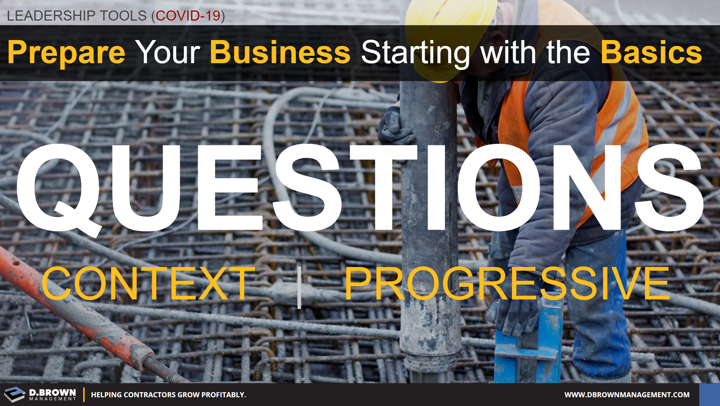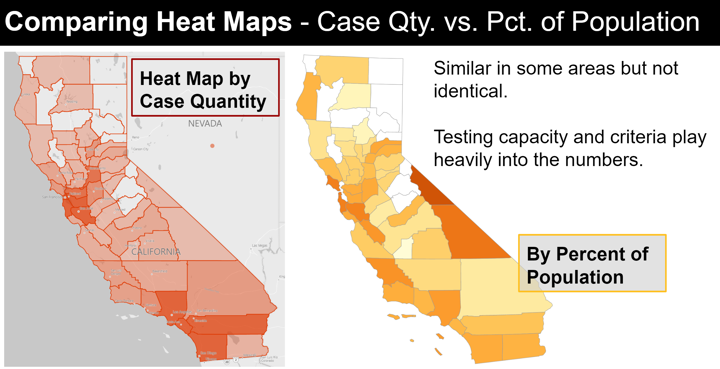"If I had an hour to solve a problem, I'd spend 55 minutes thinking about the problem and five minutes thinking about solutions.”
Utilize all the techniques for asking "Good Questions" in this 8-step checklist.
Remember that gathering more information is not the same as asking good questions. Often, Additional information only changes your confidence in the answer but not the actual accuracy, which is dangerous.
For most questions as they relate to news information, always ask "in relation to what?"
For example, if you hear that your area has "X amount" of Covid-19 cases:
- How does that compare to the population? See heat map example below.
- How does that compare to the number of cases 10 days ago?
- How does that compare to the quantity of testing?
- How does that compare to the amount of hospital beds available?
Context matters for situational awareness.
Stretch yourself to consider broader contexts when evaluating.
- For example, your backlog may seem secure and your contacts may say everything is good...but how secure is the capital, cash flow, and financing from your customers? That is a question that is likely not known at the project level.
- What if you are a subcontractor and one of your biggest GC customers goes bankrupt due to a default by one of their customers?
- The questions to ask are about how you could get information that would help you assess whether those things are a risk or not.
Consider your customers once and twice removed, including their financial partners to protect your capital.
You can't dig in to all of them so you must prioritize for those that represent your biggest risks.
The same types of questions can be asked to help you evaluate your market strategies.
“It ain't what you don't know that gets you into trouble. It's what you know for sure that just ain't so.”
Take a look at how you frame questions to ensure you are solving the right problem.
Wrong question: "How do we motivate people to come to work when they can get $1,000 per week on unemployment?"
The right questions are:
- Why are people with those values working for you?
- How could your values as a company and as a leader be interpreted to make this behavior OK?
- What could you do to make your values and purpose clearer?
- Could those values have been seen earlier, including during the hiring process?
- How do you use this as an opportunity to upgrade to people like Kent Schiller, who does whatever it takes to remain a productive member of our society?
Wrong question: "How do I ensure that people working at home are productive?"
The right questions are:
- Who specifically am I worried about being productive when not closely supervised? The truth is that the problem with high-performers working remotely is getting them to "turn it off"
- Why do I have ANYONE working for me where I'm concerned about their productivity if I'm not watching them constantly?
- How do I upgrade?
Wrong question: "How much should I cut everyone's compensation and benefits to get through this?"
The right questions are:
- What if I cut the bottom 25% of the people and paid the top 10% more to manage the extra workload in the short-term while we get through this?
- Unless you have been relentless in your talent management for a decade, it is highly likely that the math, team morale and productivity on this will work great.
- Why didn't I do this sooner?
Wrong question: "How will I be able to make money with the productivity impacts to the jobsites?"
The right questions are:
- What safety protocols do I need to put in place that will keep everyone safe and won't impact productivity?
- What equipment--such as wash stations--do I need to buy or build that will support productivity?
As you are working through talent related questions, consider that many contractors will be making absolutely stupid decisions because they are asking themselves the wrong questions. Use this as an opportunity to dramatically increase the average level of your team.
Personally, each of us must work through these questions to ensure we are very well prepared in the future:
- What do I need to do to change my health habits to minimize "high-risk" factors as much as possible?
- What do I need to do to create the individual capability to shelter-in-place for 4 weeks comfortably if needed? Food, savings, supplies, mindset?
Keep asking the right questions to ensure you are making good decisions.


